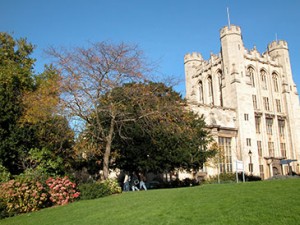The University of Bristol is to play a key role in helping the UK develop a hub to manufacture next-generation advanced semiconductor materials.
Along with the universities of Bath, Sheffield and Strathclyde and industrial partners, it has received £2.65m from the Engineering Physical Sciences Research Council (EPSRC) to fund research into advanced manufacturing techniques for nano-engineered semiconductors. Bristol’s £450,000 share of the five-year grant is.
The research will be led by Professor Martin Cryan in the Department of Electrical and Electronic Engineering and Dr Andrei Sarua in the School of Physics. 
It will focus on III-nitrides, which include semiconductors such as Gallium Nitride (GaN) that underpin the emerging global solid state lighting and power electronics industries.
Creating three-dimensional structures at the nanoscale can improve the quality of these materials and in turn the performance of these devices.
This will increase the energy efficiency in these and other emerging applications, such as water purification, where ultra-violet LEDs are used to prevent viruses reproducing.
The funding will also help develop a new generation of sensors based on nanophotonics.
Professor of Applied Electromagnetics and Photonics, Martin Cryan, said: “This grant will enable nanoscale manufacturing, such as nanoimprint lithography, currently being pursued within universities to be scaled up to 4-inch and 6-inch wafers in partnership with leading UK companies such as Plessey Semiconductors.”
Professor Cryan’s group will work with world leading numerical modelling company Lumerical Solutions to use design centering techniques, which use detailed knowledge of manufacturing tolerances to create very high-yield processes.
They will use this approach to design highly efficient LEDs and a range of nanoscale sensors which exploit resonant enhancement based on photonic crystals, nanobeams and nanopillars.
The grant comes hot on the heels of a report putting the university among the top five institutions in the UK for research.
The Research Excellence Framework (REF) 2014 shows more than 91% of eligible staff at Bristol were included in the university’s REF submission - indicating that a very high proportion of staff are producing outstanding research, across a wide range of subjects. This places Bristol among the highest in the sector.
Some 36% of the its research received the top 4* rating, defined by the Higher Education Funding Council for England (HEFCE) as ‘world-leading’ – 6% above the sector average and twice the level the university achieved in the Research Assessment Exercise (RAE) 2008.
Some 58% of impact stories achieved the top 4* rating, deemed to be ‘outstanding impacts in terms of their reach and significance’.
Vice-Chancellor Professor Sir Eric Thomas said: “We made the decision early on to submit a large proportion of our research, which sits right at the heart of our values as a research intensive university, whereby our world-leading research not only places us among the top universities, but also informs our teaching. The REF results are testament to the excellence and dedication of our staff across the institution.”






























